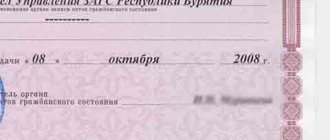Why get a certificate
The certificate is the only document certifying the heir's rights to the property that he received by inheritance.
Although there is no obligation to receive the document, without it it will not be possible to re-register property rights, therefore, obstacles will arise to the exercise of the owner’s rights. For example, in relation to property, the ownership of which requires registration with Rosreestr and other registration authorities.
We are talking, first of all, about real estate and vehicles. If these objects are included in the estate, obtaining a certificate is in the interests of the heir.
In the absence of such objects, this document is not required, but can also be issued.
Who can I get a certificate from?
Before the death of loved ones, the need for such a document does not arise, so not everyone knows who has the right to issue a certificate of inheritance.
These powers are vested in notaries, as well as officials who have the right to perform notarial acts:
- representatives of consular offices;
- heads of local administrations of districts, settlements, municipalities and other settlements where there is no notary.
But most often it is still the notary who opened the inheritance case.
Conditions for issuing a certificate
If there are grounds for obtaining inherited property, the successor turns to a notary. He is obliged to check compliance with the list of conditions for issuing a certificate.
When deciding whether a notary can issue a certificate of the right to inheritance, he is guided by Art. 72 or art. 73 Fundamentals of the legislation of the Russian Federation on notaries, depending on the basis on which the successors have the right to the property of the deceased.
Let us recall that, according to Art. 1111 of the Civil Code of the Russian Federation, they can be a law or a will.
When inheriting by law
The burden of proving their inheritance rights lies with the heirs themselves. Before receiving a certificate of inheritance, they need to prepare a number of arguments.
According to Art. 72 of the Fundamentals of the legislation of the Russian Federation on notaries, such evidence should primarily concern:
- death of the testator;
- time and place of opening of the inheritance;
- the presence of kinship or other grounds for obtaining the status of an heir;
- the volume of the hereditary mass and its location.
The basis for issuing a certificate to successors who are deprived of the opportunity to prove the existence of rights to receive inherited property may be the consent of other successors who were able to prove it.
Such consent is provided to the notary in writing. However, this is only possible within the framework of the legal inheritance process. You can learn more about this from the publication “Inheritance by Law.”
When inheriting by will
The fact of drawing up a will does not fundamentally affect the procedure for obtaining a certificate from the notary who opened the inheritance, but it does introduce additional requirements. As with inheritance by law, the notary is obliged to check a number of facts relating to the priority inheritance issues indicated above.
The conditions for issuing a certificate of the right to inheritance under a will differ only in that, according to Art. 73 Fundamentals, instead of checking kinship or other relationships, the notary checks the existence of a will.
In addition, in accordance with clause 34 of the Methodological Recommendations for Performing Notarial Actions, approved by Order of the Ministry of Justice of the Russian Federation No. 91 of March 15, 2000, it is checked whether the will has been canceled.
In order to respect the legal rights of other heirs, the circle of persons claiming the obligatory share must be clarified. More information about this and other processes can be found in the article “Inheritance by will.”
Grounds for issuing a certificate of inheritance
Obtaining a certificate is necessary in most cases. A notary issues a certificate upon the application of a citizen who has entered into an inheritance upon payment of a state fee .
A certificate of the right to inheritance is a document certifying the heir’s right to the property mass or part thereof that was assigned by the testator after death. Although the legislation of the Russian Federation does not oblige the heir to receive such a document (part 2 of paragraph 1 of Article 1162 of the Civil Code of the Russian Federation), its receipt plays an important role in the further disposal of property. Thus, state registration of property (real estate) or registration (vehicles) is often necessary.
For your information
In order to obtain a certificate, it is necessary to submit a corresponding application to a notary. However, the notary will accept the application only if there are grounds for the citizen to enter into inheritance rights.
The application contains information:
- about the location of the notary’s office where the document is submitted and information about the notary himself;
- about the applicant (his last name, first name, patronymic, registration address, contact phone number);
- about the deceased citizen-testator (last name, first name, patronymic, residential address);
- about the applicant himself - the heir. Here it is also necessary to register passport details, residential address, in addition, indicate the nature of the relationship between the heir and the testator: it can be a family, marriage relationship, or a dependent person, etc.;
- about property that is part of the inheritance of a deceased person;
- date, signature of the applicant;
To obtain a certificate of the right to inheritance, in order to enter into inheritance rights by law , the following grounds :
- the absence of a testamentary document of the deceased on the disposal of his property in someone else’s favor;
- non-acceptance or refusal of the main heirs called to inherit property under the will;
- the heirs who are indicated in the testamentary document are removed from the estate or recognized by the judicial authority as unworthy;
- the heir has the necessary documents confirming inheritance rights to the property.
To obtain a certificate of inheritance, in order to accept property under a will, you must:
- presence of a will, certified by a notary and executed in accordance with Art. 1125 Civil Code of the Russian Federation;
- the presence of a closed will, formalized by protocol in accordance with Art. 1126 Civil Code of the Russian Federation;
- the presence of a will in a simple form, written under special circumstances and executed in accordance with the requirements of Art. 1129 of the Civil Code of the Russian Federation.
Attention
The grounds for inheritance are established by Art. 1111 of the Civil Code of the Russian Federation. Thus, entry into inheritance rights by law can only take place in the absence of a will, as well as in the presence of other circumstances established by law.
Place of receipt of the certificate
Not every notary or official is able to issue one or another successor a document confirming their inheritance rights. Such powers are divided between them on a territorial basis, tied directly to the testator himself.
According to Art. 1162 of the Civil Code, a certificate of the right to inheritance is issued at the place of opening of the inheritance, which is considered to be the last place of residence or stay of the deceased (Article 1115 of the Civil Code).
Not any notary of the notarial district can do this, but only the one who opened the inheritance case. More than one case cannot be opened for one open inheritance.
To confirm the place of opening of the inheritance, the successors present to the notary a certificate of registration of the deceased at his place of residence, issued by the migration service departments or the local administration.
If the place of residence is unknown or is located outside the Russian Federation, then where to get a certificate of the right to inheritance is determined by the place where the deceased’s inherited property or its most valuable part is identified, determined based on market value.
The procedure for issuing a certificate of the right to inheritance by law and by will
Legislation and regulations regulate the fact that a certificate of the right to inheritance can be issued only at the request of the heirs or heir.
When issuing a certificate, the notary performs certain actions. When inheriting by law, a notary carries out:
- checking the fact of the death of the testator;
- establishing the place and time of opening of the inheritance property;
- identification of persons who are heirs;
- verification of the grounds for recognition as heirs of persons who filed an application;
- checking the composition of the property and its location;
- verification and establishment of other facts.
To do this, the notary requests the necessary documents by sending appropriate requests to authorities, banks, government bodies and institutions, as well as other organizations.
After collecting the appropriate evidence and checking the facts, the notary sends notices of the opening of the inheritance to all available heirs of the first priority.
When inheriting by will , the notary performs the following actions:
- checking the fact of the death of the testator;
- establishing the place and time of opening of the inheritance property;
- checking the existence of a will;
- identification of citizens who have a legal right to an obligatory share in property.
Afterwards, the notary notifies the heirs by sending a written notice to their addresses.
For your information
In cases where there are several wills, only the one written last will be valid.
To obtain a certificate, the heirs submit the following documents :
- a document that confirms the death of the testator, which includes the time of death;
- grounds for inheritance (documents certifying family relationships or a will);
- title or other documents that can confirm the rights of the deceased to his property;
- valuation of inherited property;
- documents proving the identity of the heir;
- application for entry into inheritance rights.
There are situations when the deadline for the heir to enter into inheritance is missed . In this case, some options for acquiring an inheritance :
- restore the deadline that the late heir missed;
- recognize rights to inherited property in court;
- recognize an heir who has entered into an inheritance by other heirs. This action is also performed by submitting an application to a notary (Articles 1154, 1155 of the Civil Code of the Russian Federation; clauses 42 - 44 of the Methodological Recommendations dated 02/28/2006).
Example
Citizen Petrov A.I. filed a lawsuit to restore the missed deadline for accepting the inheritance. He presented irrefutable evidence to the court that within 7 months after the death of the testator, he was undergoing rehabilitation after an accident in a medical institution. In this case, the reason is valid; accordingly, the court will satisfy the claim of citizen A.I. Petrov (clause 1, article 1155 of the Civil Code of the Russian Federation).
Procedure for issuing a certificate
Documentation of the inheritance rights of successors is impossible without their participation - the law requires the heir to contact a notary. According to Art. 1162 of the Civil Code, a certificate of accession to inheritance rights is issued upon application of the successors.
It should contain information about:
- the notary and the office to which the application is submitted;
- deceased (personal details);
- applicant-successor: personal data, nature of family ties, and so on;
- property included in the inheritance mass;
- other facts and circumstances at the request of the notary.
Submission of such an application, in accordance with Art. 1153 of the Civil Code is one of the ways to accept an inheritance. However, a certificate of right to inheritance is issued to heirs only in this order.
After receiving the application, the notary checks the sufficiency of the conditions for issuing a certificate, defined in Art. 72 or 73 Fundamentals of legislation on notaries.
Application for acceptance of inheritance
Filing an application for acceptance of an inheritance is also one of the ways to acquire an inheritance, but it does not require the mandatory production of a certificate.
The method is suitable only for those successors who actually accepted the inherited property, the ownership of which does not require registration of the transfer of rights.
The application is submitted in a similar manner and contains similar information.
Preparation of documents to confirm inheritance rights
The application is not the only document submitted by legal successors to the notary when entering into an inheritance. At a minimum, they need to prepare a package of documents confirming the existence of the conditions enshrined in Art. 72 or 73 Basic.
The result of the event will depend on the completeness of this package, and without them the notary will refuse to register the inheritance.
The specific documents required to obtain a certificate of inheritance rights should be obtained directly from the notary: in each case the package will be individual.
Documents for inheritance
To formalize their inheritance rights, successors must first submit the following documents:
- death certificate or other document confirming the death of the testator, for example, a court decision;
- marriage certificate, birth certificate, certificate of family composition and other evidence of kinship or other relationships giving rise to the right of inheritance;
- title documents of the testator;
- report on the valuation of inherited property;
- passport or other identification documents of the successor;
- application of the legal successor for the issuance of a certificate.
State fee (notary fee)
When a certificate of inheritance is issued, the successors have an obligation to pay the notarial fee defined in Art. 333.24 of the Tax Code of the Russian Federation and made dependent on the degree of relationship. Yes, for:
- for legal successors of the first and second priority (with the exception of grandparents) the state duty is 0.3% of the value of the inherited property. The amount of the duty is limited to 100 thousand rubles;
- for other legal successors, the state duty is 0.6% of the value of the inherited property. The duty amount is limited to 1 million rubles.

When calculating the value of an inheritance, both market valuation and cadastral or inventory value can be taken into account.
In addition, tax legislation provides for a number of benefits that reduce the amount of duty or exempt from payment. You can learn more about this from the material “State Duty”.
Document issue deadline
To comply with the legality and inheritance rights of all successors, the legislation defines deadlines before which the certificate cannot be issued.
According to Part 1 of Art. 1163 of the Civil Code, they are 6 months. Their countdown begins from the moment the inheritance is opened. Thus, in general cases, a certificate is issued after the expiration of the six-month period for accepting an inheritance, specified in Art. 1154 Civil Code. True, only in the absence of obstacles, in particular, legal proceedings.
The law does not exclude the possibility of issuing a certificate before the end of the specified period. According to Part 2 of Art. 1163 of the Civil Code, the basis for this may be information about the absence of successors other than those who have already contacted the notary.
In addition, the law also defines cases when the procedure and timing for issuing a certificate can be changed, in particular if:
- the successor conceived during the life of the deceased did not have time to be born six months after the opening of the hereditary estate;
- the court decided to suspend the procedure for issuing a document regardless of the reasons;
- the court is considering a dispute about shares in the inheritance, about the circle of heirs, a case about restoring the deadlines for entering into inheritance rights, and so on.
If any of these grounds exist, the period during which a certificate of inheritance is issued is subject to suspension until they are eliminated.
Obtaining a certificate
If the above conditions are met, the deadlines provided by law have expired, there are no controversial issues and the state duty established by law has been paid, the document is issued to the successors who have applied to the notary at any time convenient for them.
As a rule, all materials for its preparation are prepared for the notary in advance, so the procedure for preparing and obtaining a certificate takes only a few hours.
Specific terms of production and receipt should be discussed with the notary involved in inheritance records.
6.2. The procedure for accepting an application for the right to inheritance. Deadline for issuing a certificate of inheritanceIn accordance with Art. 1153 of the Civil Code, acceptance of an inheritance is carried out by submitting, at the place of opening of the inheritance, to a notary or an official authorized in accordance with the law to issue certificates of the right to inheritance, an application from the heir to accept the inheritance or an application from the heir to issue a certificate of the right to inheritance. If the heir's application is handed over to the notary by another person or sent by mail, the heir's signature on the application must be certified by a notary or an official authorized to perform notarial acts (an official of a local government body or a consular office). Equated to notarized ones (clause 1 of Article 1153 with reference to clause Zet. 185 of the Civil Code): - signatures of military personnel and other persons undergoing treatment in hospitals, sanatoriums and other military medical institutions, the authenticity of which is certified by the head of such an institution, his deputy for medical affairs, senior or duty doctor; - signatures of military personnel at locations of military units, formations, institutions and military educational institutions, where there are no notary offices and other bodies performing notarial acts, as well as signatures of workers and employees, members of their families and family members of military personnel, the authenticity of which is certified by the commander ( chief) of this unit, formation, institution or institution; - signatures of persons in places of deprivation of liberty, the authenticity of which is certified by the head of the corresponding place of deprivation of liberty; - signatures of adult capable citizens located in social protection institutions, the authenticity of which is certified by the administration of this institution or the head (his deputy) of the relevant social protection authority. In case of personal appearance of the heir to the notary, notarization of the authenticity of his signature is not required. In this case, the notary establishes the identity of the heir and himself verifies the authenticity of his signature, which he makes a note on the application indicating the name of the identity document and the details of this document. Notarization of the authenticity of the heir's signature on the application for acceptance of the inheritance is also not required if an application for acceptance of the inheritance has already been submitted to the notary and the signature on it has been notarized, and subsequently the same heir submitted another application regarding another inherited property. For minor children under the age of 14 years, an application for acceptance of inheritance is submitted by their parents, adoptive parents or guardians; for citizens declared legally incompetent - by their guardians. Minors aged 14 to 18 years apply when submitting an application to accept an inheritance themselves, but with the consent of their parents, adoptive parents or trustees. Persons whose legal capacity has been limited by a court due to alcohol or drug abuse submit applications to accept an inheritance with the consent of the trustees. The powers of the legal representatives of the heirs must be verified by a notary, and a corresponding note is made (usually on the application for acceptance of the inheritance). Permission from the guardianship and trusteeship authorities is not required to accept an inheritance. An application for acceptance of an inheritance may be submitted by proxy by a representative of the heir, if the power of attorney specifically provides for the authority to accept it. All applications received by the notary for acceptance of inheritance are registered in the book of registration of inheritance affairs, on their basis, the notary opens an inheritance case, which is registered in the alphabetical book of registration of inheritance affairs. If the notary, within six months from the date of opening of the inheritance, receives an application from the heir, the signature on which is not notarized, it is also registered in the register of inheritance affairs and an inheritance case is also opened with registration in the alphabetical book of accounting of inheritance affairs. In this case, the heir is not considered to have missed the deadline for accepting the inheritance, but a certificate of the right to inheritance cannot be issued to him upon such an application. The heir is recommended to fill out the application properly or appear in person before the notary. The application for acceptance of an inheritance may not indicate the composition of the inherited property or not all of the inherited property may be indicated. In this case, the deadline for acceptance of the inheritance by the heir is also not considered missed, however, to obtain a certificate of the right to inheritance, this data in the application is not enough. A certificate of inheritance is issued on the basis of an application in which the inherited property is specified. At the same time, if the application does not indicate, for example, the assessment of the inherited property, but the materials of the inheritance case contain information about it, the absence of an indication of the assessment in the application is not of fundamental importance. It is unacceptable for a notary to refuse to accept an application for acceptance of an inheritance due to the fact that the heir has not confirmed the family relationship with the testator, the place of opening of the inheritance, the composition of the inherited property, etc. All missing documents can be submitted by the heir immediately before issuing a certificate of right to inheritance. If the application for acceptance of the inheritance is received by the notary after the expiration of six months from the date of opening of the inheritance, but is submitted by the heir or his representative by mail in a timely manner, the heir is considered to have accepted the inheritance within the period established by law. To prove this, an envelope with the stamp of a postal organization or a receipt for sending a letter (valued or registered) should be attached to the inheritance file. This practice is based on the norm of paragraph 2 of Art. 194 Civil Code. The application for acceptance of an inheritance by law must list all the heirs of the line called for inheritance, and the application for acceptance of an inheritance under a will - all heirs entitled to an obligatory share in the inheritance, indicating their place of residence. The notary is obliged to notify about the opening of the inheritance those heirs whose place of residence is known to him. At the same time, the expiration of the period established by law for accepting the inheritance does not relieve the notary from the obligation to notify the heirs about the opened inheritance, taking into account the fact that they can prove the fact of their timely acceptance of the inheritance or restore the missed deadline for accepting the inheritance. Deliberate concealment by any of the heirs of the fact of the existence of other heirs or any of them may lead to the recognition of the issued certificate of the right to inheritance as invalid, however, responsibility in this case rests not with the notary, but with the heir himself, who did not report the presence of other existing heirs . Moreover, such actions of the heir may serve as grounds for recognizing this heir as unworthy in accordance with the norm of paragraph 1 of Art. 1117 Civil Code. Several heirs, whose grounds for inheritance are the same, can submit to the notary one application signed by all of them for acceptance of the inheritance (for example, heirs by law, as well as heirs by will, if the same property is bequeathed to them). Heirs under a will, to whom different property has been bequeathed, submit separate applications for acceptance of the inheritance. Separate applications for the issuance of a certificate of the right to inheritance are also submitted by the heir under the will and the heir who has the right to an obligatory share in the inheritance. In accordance with Art. 1163 of the Civil Code, a certificate of the right to inheritance is issued to the heirs at any time after six months from the date of opening of the inheritance, with the exception of certain cases. When inheriting both by law and by will, a certificate of the right to inheritance can be issued before the expiration of six months from the date of opening of the inheritance, if there is reliable information that, in addition to the persons who applied for the issuance of the certificate, other heirs who have the right to inheritance or relevant part thereof, is not available. The issuance of a certificate of the right to inheritance is suspended by a court decision, as well as in the presence of a conceived but not yet born heir.
Document validity period
Despite the prevailing stereotype, the certificate does not have a statutory period during which it is valid and can be presented at the place of request.
A certificate of inheritance is a perpetual document, the validity of which is not tied to time, so it can be used at any time before the death of the successor indicated in it.
As a rule, it is used to register rights to transferred property, but other uses are also possible.
Number of copies
The number of copies of the certificate is determined by the legal successors themselves, based on the composition of the heirs. So, according to Art. 1162 of the Civil Code, at their will, the document can be issued either in a single copy - for all heirs together, or in multiple copies - for each of the applicants separately.
In addition, it can be issued both for the entire inheritance mass and for each individual part in it.
If, after completing all the documents and issuing certificates, other property is discovered that is not covered by the documents, an additional certificate of inheritance is issued. It may indicate not only the discovered property of the deceased, but also the heirs who missed the deadline for receiving the inheritance.
According to Art. 71 Fundamentals, this will require the consent of everyone who has already accepted the inherited property.

Notary fee (cost) for issuing a certificate
When receiving a certificate of inheritance, you must pay a state fee. Depending on the degree of relationship, the size of the tariff established by Art. 333.24 of the Tax Code of the Russian Federation:
- for heirs of the first and second priority (except for grandparents) - 0.3% of the value of the inherited property in the part that is due to this heir. The limitation on the maximum amount of state duty in this case is 100,000 rubles;
- for other heirs - 0.6% of the value of the inherited property in the part that is due to this heir. The limit on the maximum amount of state duty in this case is 1,000,000 rubles.
In cases where the value of the property is unknown, it can be determined by specialized organizations .
Payment for carrying out activities to evaluate the inherited property is carried out at the expense of the heirs or one of them, by agreement. In extreme cases, such issues can be resolved by a judicial authority. And in some (exceptional) cases, payment for assessment activities is made from the funds of the inherited property.
The legislation establishes (clause 1 of Article 333.25 of the Tax Code of the Russian Federation) that the assessment must be carried out at the time of opening of the inherited property.
However, property does not always need to be valued. The Tax Code of the Russian Federation stipulates that the state fee should be calculated when issuing a certificate of title to inherited property based on the following options for the value of such property:
- inventory value;
- cadastral value;
- market value;
- nominal value.
In this case, the notary is not authorized to demand a document confirming a particular value of the property. If there are several documents that confirm the value of the property and this value differs, in this case the calculation can be made from the lowest value of the property.
Information
In accordance with Art. 333.38 of the Tax Code of the Russian Federation, there is a category of persons and types of property, upon inheritance of which citizens entering into inheritance rights are exempt from paying the fee or do not pay it in full upon receipt of the certificate.
Such benefits arise in the following cases:
- upon entry into the inheritance rights of citizens with disabilities of the first and second groups, payment of the state duty is carried out in the amount of 50% of the amount of such duty;
- upon entry into the inheritance rights of citizens living together with the testator and inheriting after his death, this residential building and the plot on which this house is located;
- when inheriting deposits, wages, insurance amounts, royalties;
- when inheriting property, if the testator died while performing duties or tasks in connection with his official position, etc. ;
- if the heirs are minors, minors and incapacitated citizens;
- other persons established by law.
In addition to paying the state fee, the notary is usually paid for his technical or legal work . Tariffs for such work are not clearly regulated by law and can be set by notary offices independently.
It should be noted that the notary has no right to charge fees for such services or impose services on citizens. Such services can be provided by a notary only with the consent of the citizens themselves.
To resolve disputes regarding the calculation and application of state duty calculations by notaries, citizens have the right to apply to the courts to protect their rights and legitimate interests.
Example
Citizen “P” applied to the district court to establish the cadastral value of a residential property in an amount equal to its market value. In substantiating her claims, citizen “P” indicated that she is the heir to this property. When paying the state fee for issuing a certificate of inheritance, the notary calculated the tariff based on the cadastral value of the property. However, the plaintiff does not agree with this cost, since she believes that the cost is too high. In order to confirm her arguments, citizen “P” turned to independent experts to conduct an independent examination of the market value of home ownership. Experts have calculated the market value, which is 200,000 (two hundred thousand) rubles less than the cadastral value.
The applicant asks the court to establish the cadastral value of the home ownership equal to the market value determined by experts.
Having studied the case materials, heard the parties, and analyzed the current legislation, the court came to the conclusion that the stated requirements were satisfied for the following reasons:
- establishing the market value of an object is a legal way to clarify the cadastral value of an object;
- the assessment was carried out by specialists legally and in accordance with the requirements of laws and regulations;
- the inflated cadastral value of home ownership entails the burden of mandatory payments, the amount of which depends on the cadastral value of the property.
Refusal to issue a certificate
Despite the extensive law enforcement practice, transparent procedure and accessibility of legislation, we often hear about cases where a notary refuses to issue a certificate of inheritance.
Art. 48 Fundamentals of Notary Legislation identifies 7 grounds on which a refusal can be made. All of them boil down to non-compliance with the conditions for issuance, non-compliance of documents with legal requirements, contacting the wrong notary or application by a person who does not have the authority to apply.
If the grounds specified in the article exist, the refusal should be considered legal. If a notary does not issue a certificate for other reasons, his actions can be appealed in court.
Upon receipt of a refusal, the successor has the right to request from the notary not only an explanation of the procedure for appealing his actions, but also a written statement of the reasons for the refusal. The notary is obliged, no later than 10 days from the date of application, to issue a resolution refusing to issue a certificate of inheritance.
Having received a document with a written justification for the refusal, the heir goes to court to appeal the refusal to perform notarial acts, if the refusal, in the opinion of the applicant, is not justified.
According to Art. 49 Fundamentals, for this it is necessary to file a complaint with the district court at the location of the notary within 10 days from the date of receipt of the refusal, which is submitted along with the decision.
If the applicant manages to prove that the official’s claims are unfounded, the notary’s refusal to issue a certificate of inheritance will be canceled by an appropriate court decision, which will entail legal consequences.
According to Art. 312 of the Code of Civil Procedure, a court decision that satisfies the applicant’s complaint against the notary’s refusal decision automatically obliges him to perform notarial acts, which the official refused to perform. Simply put, the notary will have to inform you that such a certificate of inheritance, which he previously refused to issue, will still be issued.
In addition, according to Art. 34 of the Fundamentals, control over the activities of private notaries is exercised by notary chambers and territorial bodies of the Ministry of Justice (for state ones). As a result of filing a complaint with these authorities, the notary may be subject to disciplinary action.
Deadline for issuing a certificate of inheritance
The certificate is issued to the heirs or successor within the time limits established by the legislation of the Russian Federation. So, according to paragraph 1 of Art. 1163 of the Civil Code of the Russian Federation, the document is issued after the expiration of the six-month period for entry into the inheritance mass, at any time (if there is an application for entry into the inheritance or the fact of its acceptance). But only if there are no obstacles to its issuance (for example, there is a dispute regarding this inheritance that is pending in court).
However, there are cases where a certificate may be issued before the expiration of such deadlines. The basis for this may be :
- the absence of persons other than the heirs who have already declared themselves;
- absence of litigation or other reasons;
- the presence of a court decision on early entry into inheritance rights.
Also, the legislation provides for cases when the issuance of a certificate may be suspended . Such situations arise under the following circumstances:
- the heir has not yet been born during the period provided for acceptance of the inheritance;
- there is a court decision to suspend the issuance of a certificate for any reason;
- there is legal proceedings regarding a dispute regarding this inheritance between the heirs and/or interested parties.
This list, defined in Art. 1163 of the Civil Code is exhaustive .
Important
If a notary refuses to issue a certificate within the time limits established by law without explaining the reasons, or such reasons are not grounds for refusal, as well as in other cases of refusal, the heirs can appeal the notary’s refusal in court. Having previously received a written document (refusal) from a notary.
All rules on the timing of issuing certificates are contained in the Civil Code and in the fundamentals of the legislation of the Russian Federation on notaries.
Registration of ownership of inherited property
Having completed all the documents with a notary, not all legal successors know what to do after receiving a certificate of acceptance of inheritance.
In the context of this, it is important to understand that the certificate of inheritance establishes ownership only of that property that does not require registration. The rest of the property - real estate, land plots, cars, securities - is considered accepted only after state registration and other forms of accounting.
Therefore, after receiving the certificate of inheritance, the successor must register the transfer of rights to the property, the result of which should be a certificate of ownership.
Certificate of inheritance after the death of a relative
Entering into inheritance, for example, after the death of a husband or mother is possible in two ways. The first of these is actual inheritance. To establish this legal fact, the relatives of the deceased must take actions in favor of the abandoned property. For example, the fact of entry can be established: living in an apartment, paying the debts of the deceased, ensuring the safety of property.
In case of actual inheritance, there is no need to contact a notary's office after the death of the testator. At any time later, you can obtain a certificate of inheritance from a notary. Without a certificate issued by a lawyer, it is impossible to register the property as the property of the receiver at the registration authorities.
Re-registration of inheritance is carried out by specialized bodies. You can register an apartment at Rosreestr or the MFC, a car at the traffic police department, a deposit at the bank.
The second way to accept an inheritance is to contact a notary immediately after the death of the testator. Within a certain period, applicants for property must write an application and provide a package of necessary documents. A certificate of acceptance of inheritance will be issued to each recipient after consideration of the inheritance case and verification of the documents provided.








